
This report explores cross-national perceptions of gender equality, including the opportunities available to men and women and the power they wield in family decisions. It also examines expectations for the future of gender equality across countries.
For this report, we used data from a survey conducted across 34 countries from May 13 to Oct. 2, 2019, totaling 38,426 respondents. The surveys were conducted face-to-face across Africa, Latin America and the Middle East, and on the phone in United States and Canada. In the Asia-Pacific region, face-to-face surveys were conducted in India, Indonesia and the Philippines, while phone surveys were administered in Australia, Japan and South Korea. Across Europe, the survey was conducted over the phone in France, Germany, the Netherlands, Spain, Sweden and the UK, but face-to-face in Bulgaria, the Czech Republic, Greece, Hungary, Italy, Lithuania, Poland, Russia, Slovakia and Ukraine.
Here are the questions used for the report, along with responses, and the survey methodology.
Twenty-five years after the United Nations’ Beijing Declaration and Platform for Action pledged to take the necessary steps to “remove all obstacles to gender equality and the advancement and empowerment of women,” support for gender equality is strong around the globe. Across 34 countries surveyed by Pew Research Center, a median of 94% think it is important for women in their country to have the same rights as men, with 74% saying this is very important.
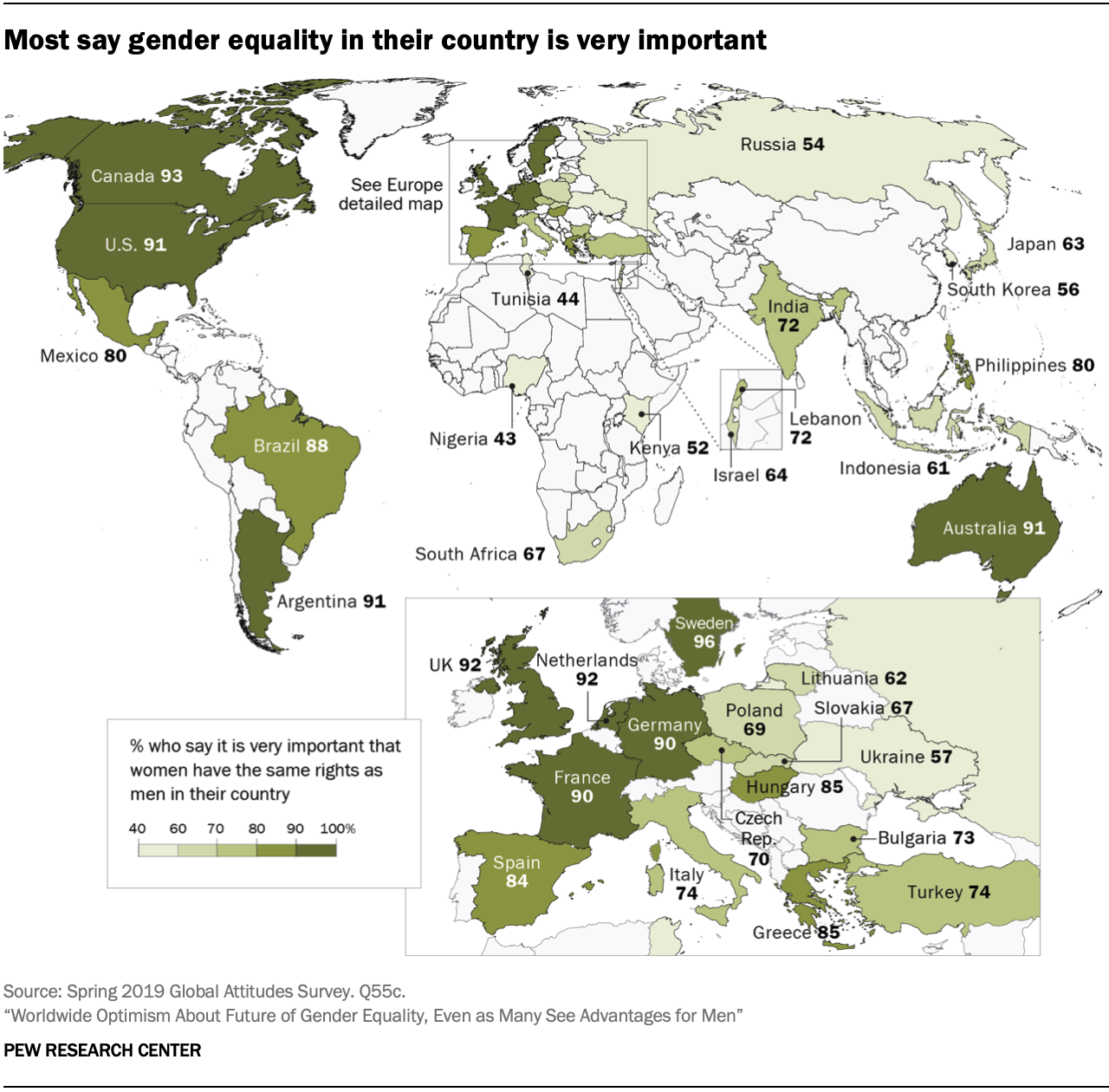
In many countries, women place more importance on gender equality than men do. However, women are less optimistic than men that women in their countries will achieve equality in the future, and they are more likely to say men have better lives than women.
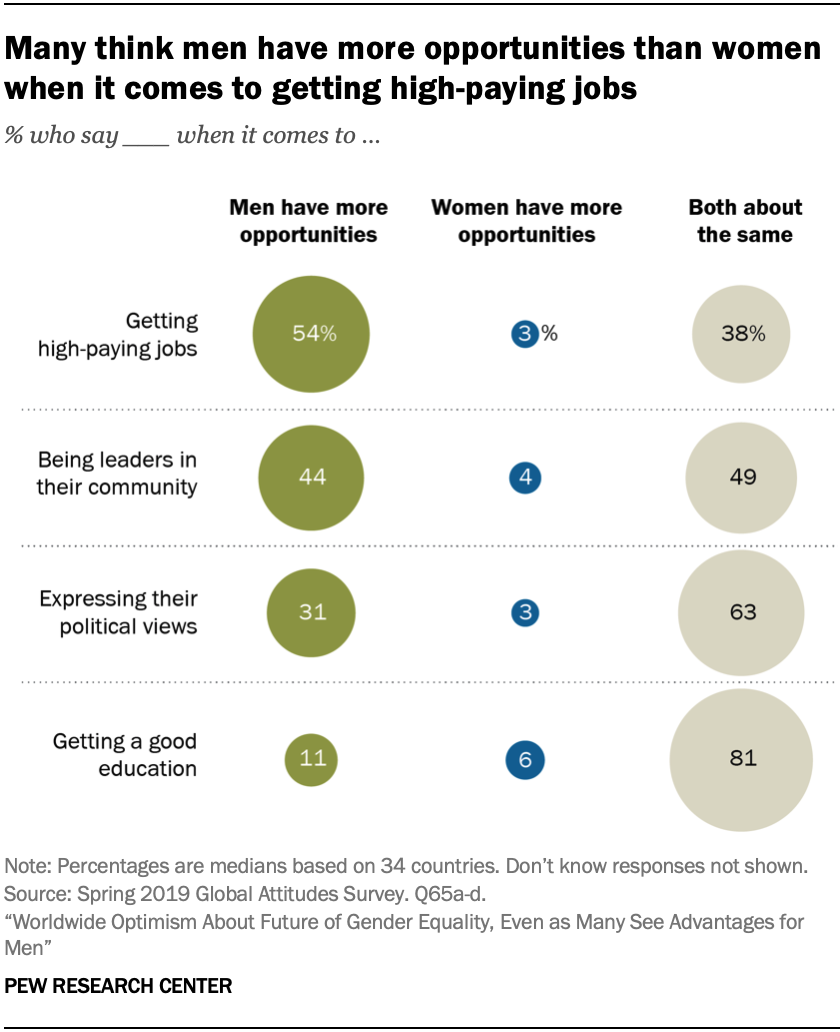
While publics around the world embrace the idea of gender equality, at least four-in-ten think men generally have more opportunities than women in their country when it comes to getting high-paying jobs (a median of 54% across the 34 countries surveyed) and being leaders in their community (44%). Publics see more equity in access to a good education – a median of 81% believe men and women in their country generally have the same opportunities in this area – and expressing their political views (63% say men and women have the same opportunities). No more than 6% say women have more opportunities than men in any of these realms.
Majorities in most European countries surveyed, as well as in Japan, South Korea, Israel, Australia, Canada and the United States, say men in their country have more opportunities than women when it comes to getting high-paying jobs. When it comes to being leaders in their communities, more than half in Nigeria, South Korea, Japan, Turkey, Israel, Lebanon, Italy, Tunisia, Greece, France and Slovakia think men in their country have more opportunities than women.
Despite widespread support for gender equality around the world, a notable share (a median of 40% across the countries surveyed) thinks men should have more right to a job than women when jobs are scarce; 56% disagree with this notion. In some countries, men are more likely than women to say men should have preferential treatment when jobs are scarce, with double-digit gender differences in Kenya, Nigeria, Bulgaria, South Africa, Israel, Slovakia, Italy, Argentina and the Czech Republic.
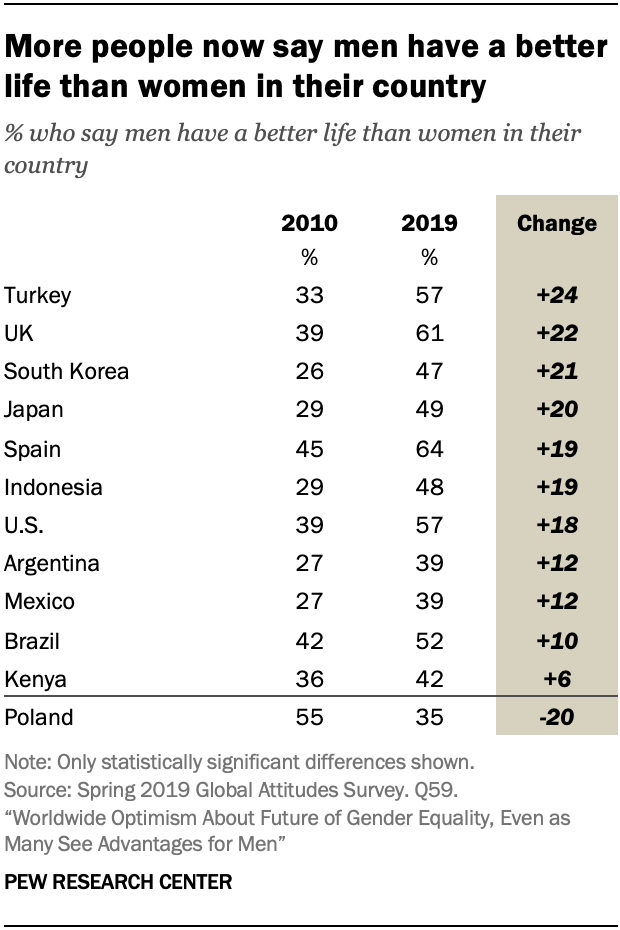
When asked who has a better life in their country, a 46% median across the 34 countries surveyed say men do, while 15% point to women and 31% volunteer that neither men nor women have a better life. Majorities in France, Spain, Sweden, the UK, Canada, the U.S., Turkey, Australia and the Netherlands think men have a better life than women in their country. Tunisia is the only country surveyed where more say women have a better life than say men do, although similar shares say women have a better life as say both men and women enjoy the same quality of life.
In most of the 34 countries surveyed, women are more likely than men to say men have a better life in their country. Gender differences are particularly large on this question in Greece (women are 27 percentage points more likely to say this), Slovakia (25 points), Italy (25), Canada (20), Brazil (20), Hungary (19) and Turkey (18).
The shares saying that men have a better life than women in their country have increased considerably since 2010 in many of the countries where trends are available – possibly as a result of increased awareness of gender issues spurred by the #MeToo Movement – with differences of at least 20 percentage points in Turkey, the UK, South Korea and Japan. Poland is the only country surveyed in both years where a smaller share now says men have a better life than did so in 2010.
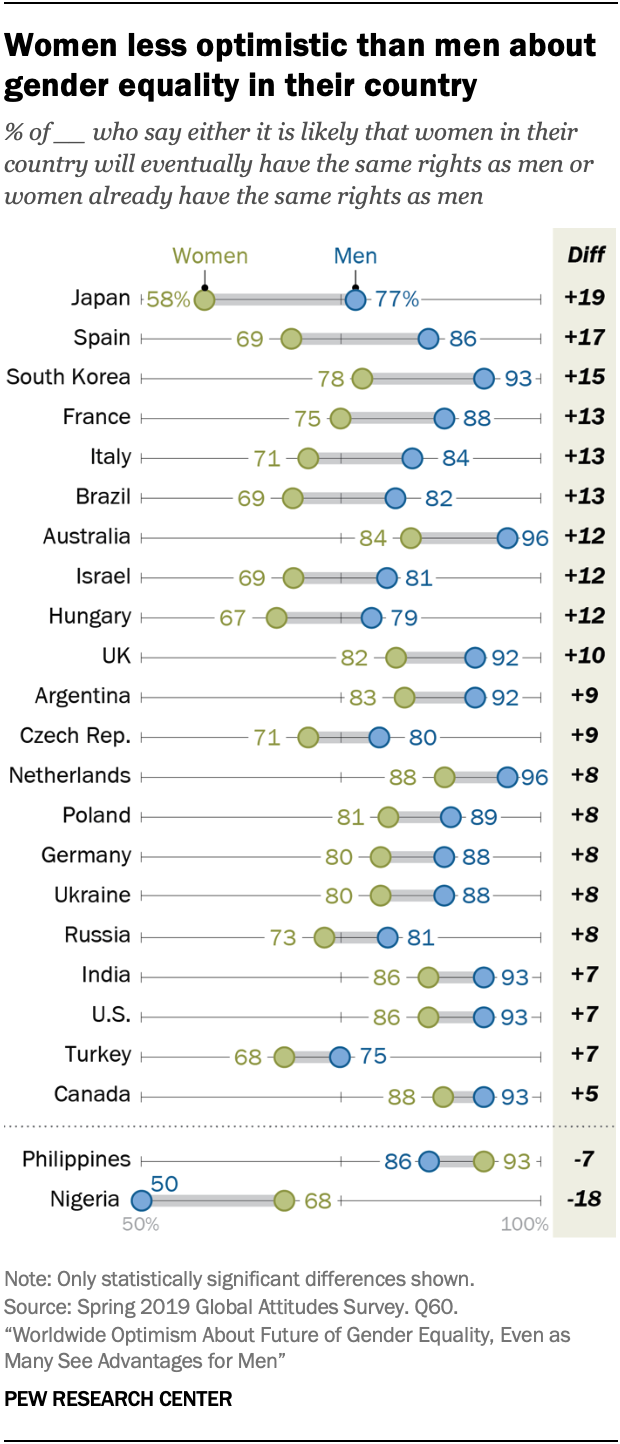
Despite seeing some advantages for men, most people express optimism about the future of gender equality in their country. A median of 75% across the 34 countries surveyed think it is likely that women in their country will eventually have the same rights as men, and 5% volunteer that women in their country have already achieved equality.
Men tend to be more optimistic than women about prospects for gender equality, with gender differences of at least 10 percentage points in 10 countries and smaller but significant differences in 11 others. For example, 77% of men in Japan – compared with 58% of women – say it’s likely that women in their country will eventually attain or already have the same rights as men. Nigeria and the Philippines are the only countries surveyed where a larger share of women than men are optimistic about gender equality.
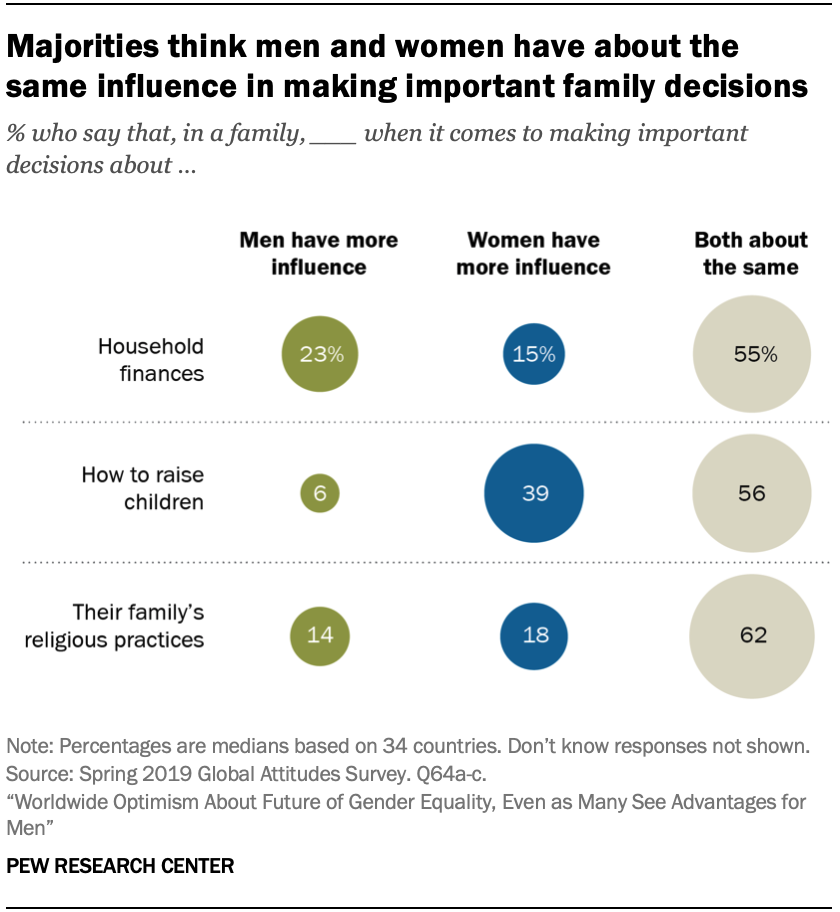
When it comes to family life, the sense is that men and women have about the same influence in making important decisions in their households. A 34-country median of 55% say both have roughly equal influence when it comes to important decisions about household finances, 56% say this about how to raise children and 62% say this of decisions about a family’s religious practices. To the extent that people see a difference, however, men are generally seen as having more of an influence than women when it comes to decisions about household finances, while women are generally seen as having more influence when it comes to decisions about raising children.
In nearly every country surveyed, majorities say that a marriage where both the husband and wife have jobs and take care of the home is more satisfying than one where the husband provides for the family and the wife takes care of the house and children. Even so, sizable shares in many countries say a more traditional marriage would be preferable, including about four-in-ten in India, Indonesia, Lebanon, Turkey and Tunisia.
These are among the major findings from a Pew Research Center survey conducted among 38,426 people in 34 countries from May 13 to Oct. 2, 2019.
Widespread support for equal rights for men and women
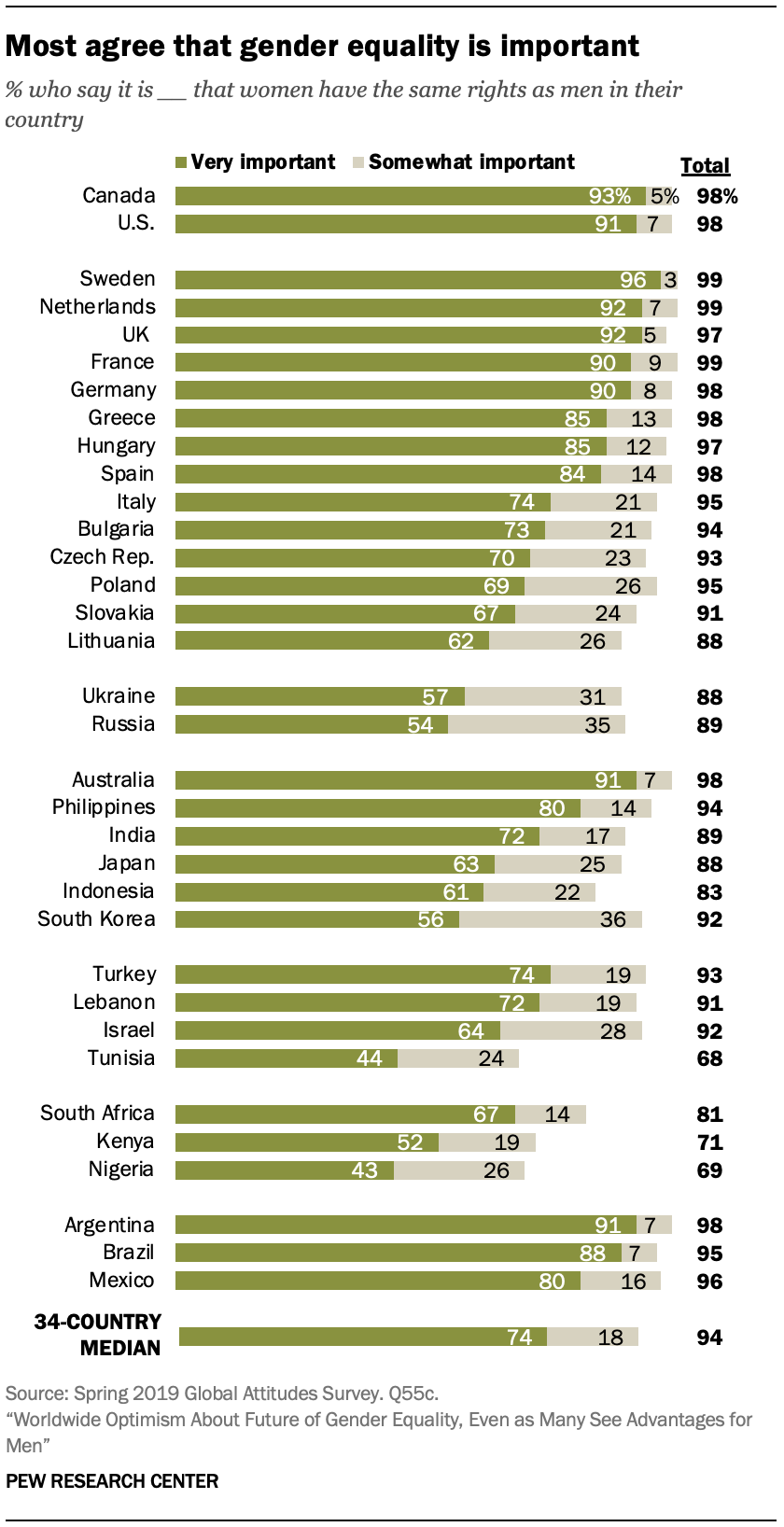
Most people agree it is important for women to have the same rights as men in their country. Across the 34 countries surveyed, a median of 94% hold this view, including nearly all in Sweden, the Netherlands, France, the U.S., Canada, Germany, Greece, Spain, Australia, Argentina, the UK and Hungary.
In addition, majorities in 30 nations say it is very important that men and women have the same rights in their country. The share who endorse this stronger sentiment varies across countries, however.
In Sweden, the most egalitarian country included in the survey based on indices from the World Economic Forum and the United Nations Development Program, 96% believe gender equality is very important. By comparison, substantially smaller shares hold this view in Tunisia (44%) and Nigeria (43%), two countries with relatively higher levels of gender inequality. Strong support for gender equality is also relatively less common in Kenya, Russia, South Korea and Ukraine.
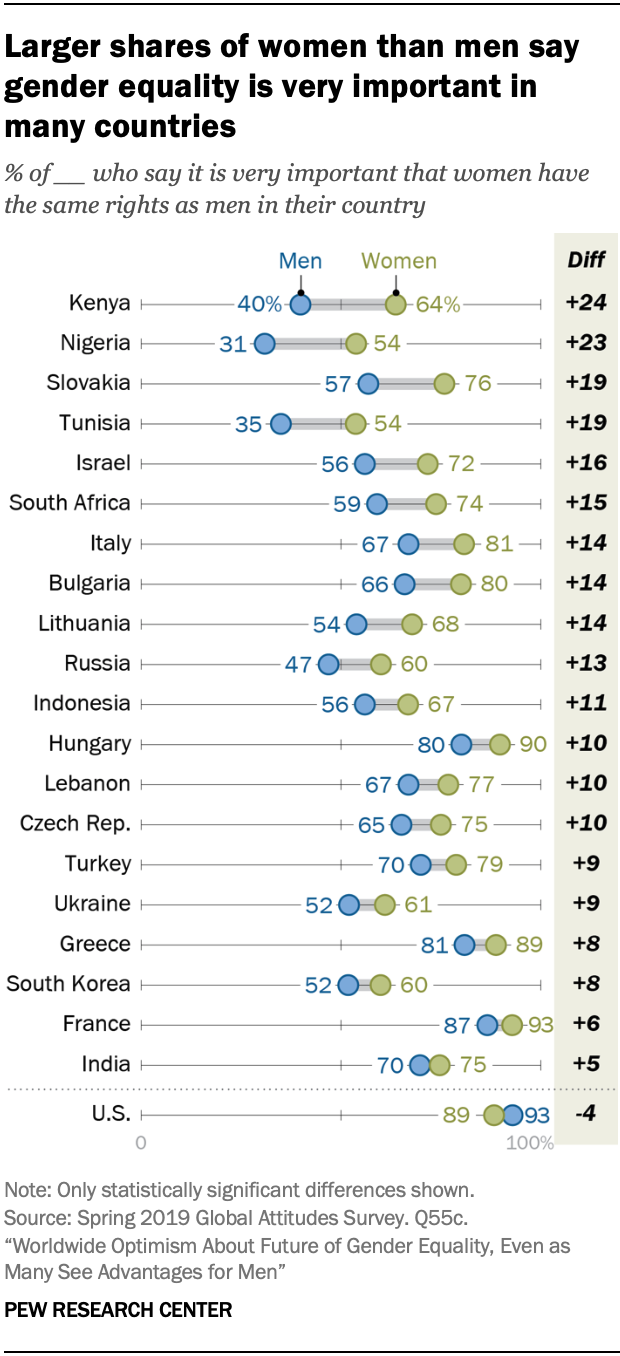
Within each country, views of equality often differ by gender. In 20 nations, women are more likely than men to say gender equality is very important. This gender difference is largest in Kenya and Nigeria, where relatively small shares overall view equal rights as very important. More than half of women in Nigeria (54%) think gender equality is very important, compared with only 31% of men. And while 64% of Kenyan women say gender equality is very important, just 40% of Kenyan men express the same view. In many countries where overwhelming majorities endorse equality, men and women do not differ in their views.
The U.S. is the only country where men are more likely than women to say it is very important for men and women to have the same rights. But while the difference is statistically significant, it is fairly small: 93% of men hold this view, compared with 89% of women.
Educational attainment is also related to views of gender equality. In 26 countries, those with more education are more likely than those with less to believe it is very important for women to have the same rights as men.1 The largest differences are in Lithuania and the Czech Republic. Three-quarters or more of those with more education in Lithuania (76%) and the Czech Republic (87%) hold this view, compared with 54% of Lithuanians and 66% of Czechs with less education. There are also educational differences of 10 percentage points or more in Italy, Bulgaria, South Korea, Mexico, the Philippines, Ukraine, Spain, Poland and Nigeria.
People in most countries are optimistic about the future of gender equality
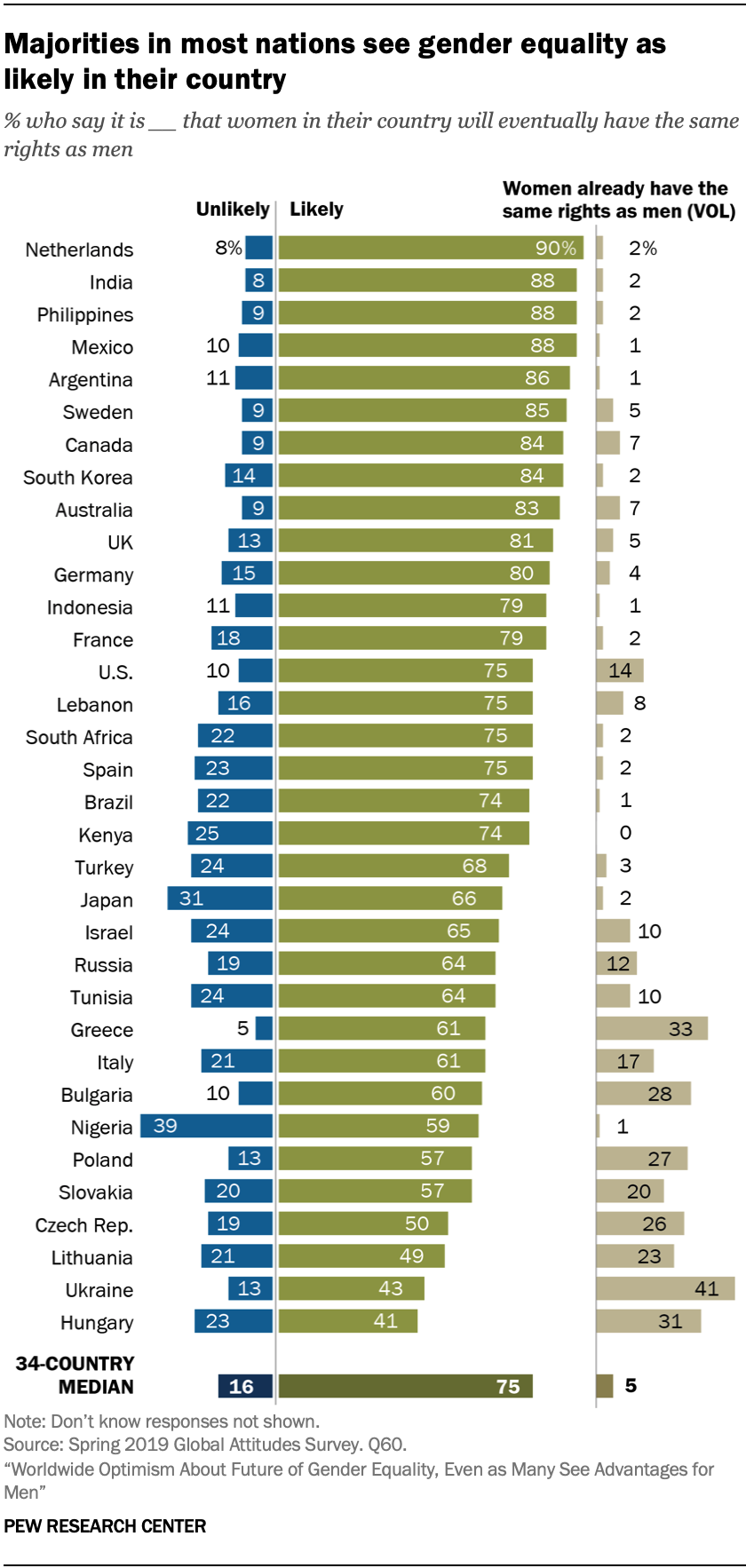
In addition to viewing gender equality as important, most people are optimistic that women will eventually have the same rights as men in their country. Majorities in 30 of the 34 countries surveyed hold this view, including roughly 90% in the Netherlands, India, the Philippines and Mexico.
In the U.S., 75% believe gender equality is likely. An additional 14% volunteer the response that women already have the same rights as men. One-in-ten or more in most Central and Eastern European nations, as well as Ukraine, Greece, Italy, Russia, Israel and Tunisia, agree that women and men already have equal rights.
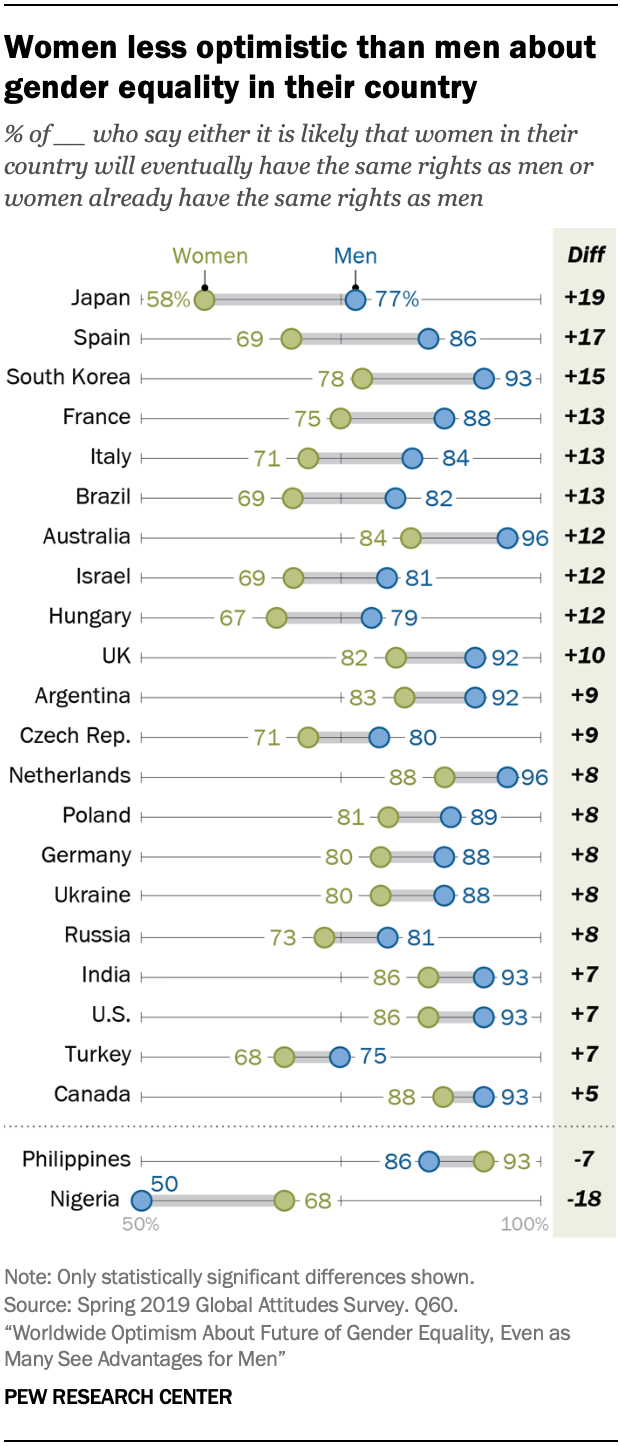
Despite widespread optimism globally, substantive shares in some of the countries surveyed say it is unlikely that women will eventually have the same rights as men in their country. About a quarter or more in Nigeria, Japan, Kenya,Turkey, Israel, Tunisia, Spain and Hungary are pessimistic about the prospects for gender equality in their country.
Across many countries, women are less optimistic than men about the likelihood of attaining gender equality. For example, 77% of men in Japan think either men and women already have equal rights or that it is likely they will in the future, compared with 58% of Japanese women. Similar gender differences can be found in 20 other countries, including roughly 15 percentage point differences in Spain, South Korea, France, Italy and Brazil.
Nigeria and the Philippines are the only publics that show the opposite pattern: Larger shares of women than men say gender equality is likely. Half of men in Nigeria express this view, compared with 68% of women.
Majorities in many African, Middle Eastern and Asian-Pacific publics say men should have preferential treatment when jobs are scarce
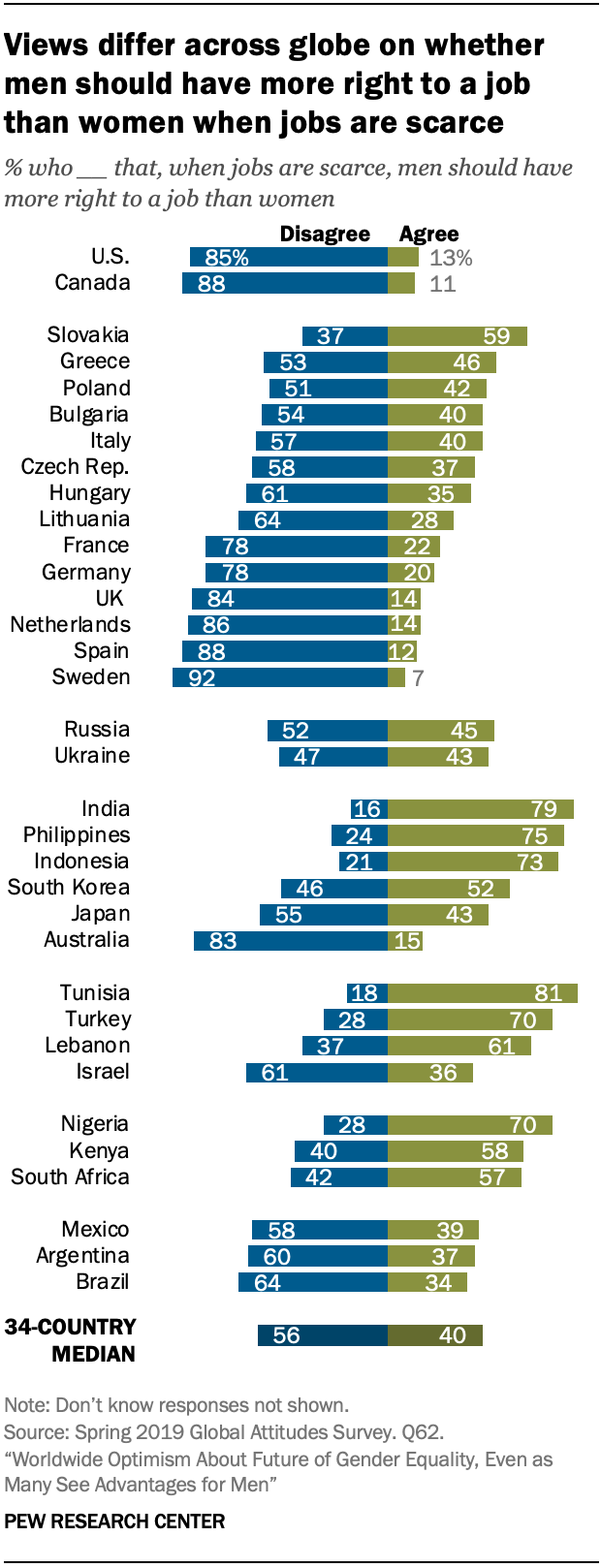
Across the 34 countries surveyed, a median of 56% disagree with the notion that men should have more right to a job than women when jobs are scarce; 40% agree that men should receive preferential treatment in this situation.
In nearly all North American, Western European and Latin American countries surveyed – as well as in Australia, Lithuania, Hungary, Israel, the Czech Republic and Japan – majorities reject the idea that men should have more right to a job than women in tough economic times, as do pluralities in Poland and Bulgaria. This is particularly the case in Sweden, Canada, Spain, the Netherlands, the U.S., the UK, Australia, France and Germany, where roughly eight-in-ten or more disagree that men deserve preferential treatment when jobs are scarce.
In contrast, majorities in the African countries surveyed, as well as in India, the Philippines, Indonesia, Turkey and Lebanon, agree that men should have more right to a job than women when jobs are scarce. Roughly eight-in-ten say this in Tunisia and India.
Views on this remain virtually unchanged in most of the countries where the question has been previously asked (most recently in 2012 in Lebanon, Turkey and Tunisia and in 2010 in 15 other countries). Publics are now more likely to agree that men should have preferential treatment when jobs are scarce in Kenya (12 percentage points higher), Lebanon (+11 points) and Mexico (+11 points). Meanwhile, the shares saying men should have more right to a job in tough economic times have dropped in South Korea (8 percentage points less likely), Nigeria (-7 points) and Argentina (-6 points).
Across 30 of the 34 countries surveyed, those with less education are more likely to believe men should have more right to a job than women when jobs are scarce. For example, majorities of six-in-ten or more among those with less education in Turkey, Lebanon, Kenya, Slovakia, South Africa and South Korea agree, compared with roughly half or fewer of those with more education in these countries.
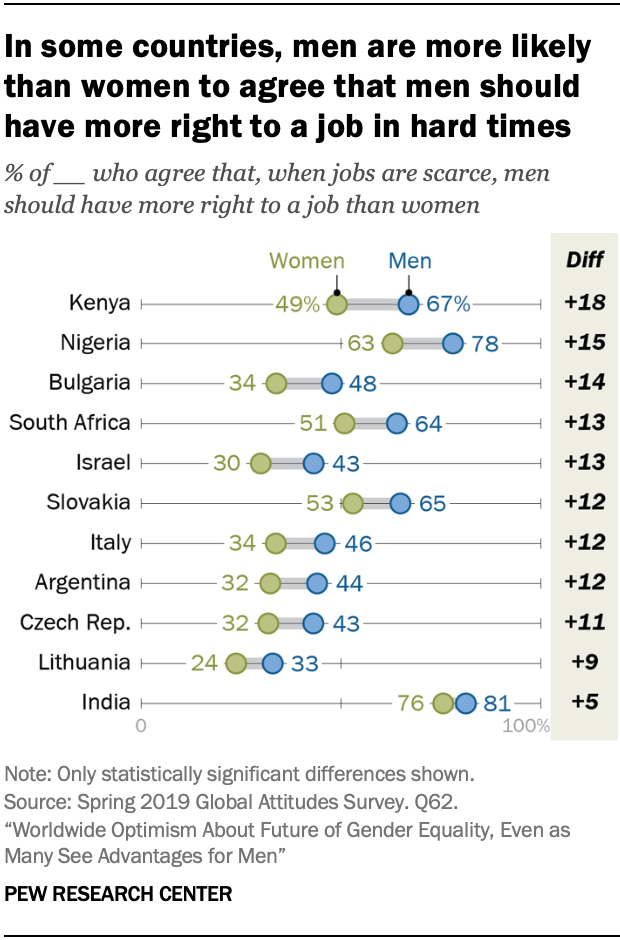
Income is also related to views on this. In most countries surveyed, those with lower incomes – equivalent to the median for their country or less – are more likely than those with higher incomes to say men should have more right to a job during tough economic times. In the U.S., Australia and much of Western Europe, those with lower incomes are at least twice as likely as those with higher incomes to believe men should receive preferential treatment when jobs are scarce. Still, only about a quarter or fewer across income groups in each of these countries say this.
In some countries, men are more likely than women to agree that men deserve preferential treatment when jobs are scarce, with double-digit differences in Kenya, Nigeria, Bulgaria, South Africa, Israel, Slovakia, Italy, Argentina and the Czech Republic.
There are also double-digit differences between the oldest and youngest age groups in South Korea, Brazil, Italy, Greece, Argentina, Poland, Lebanon, the Philippines, Israel, Australia, France and Spain: In each of these countries, adults ages 50 and older are more likely than those ages 18 to 29 to agree that men should have more right to a job during tough economic times.
Across the globe, many believe men in their country have a better life than women
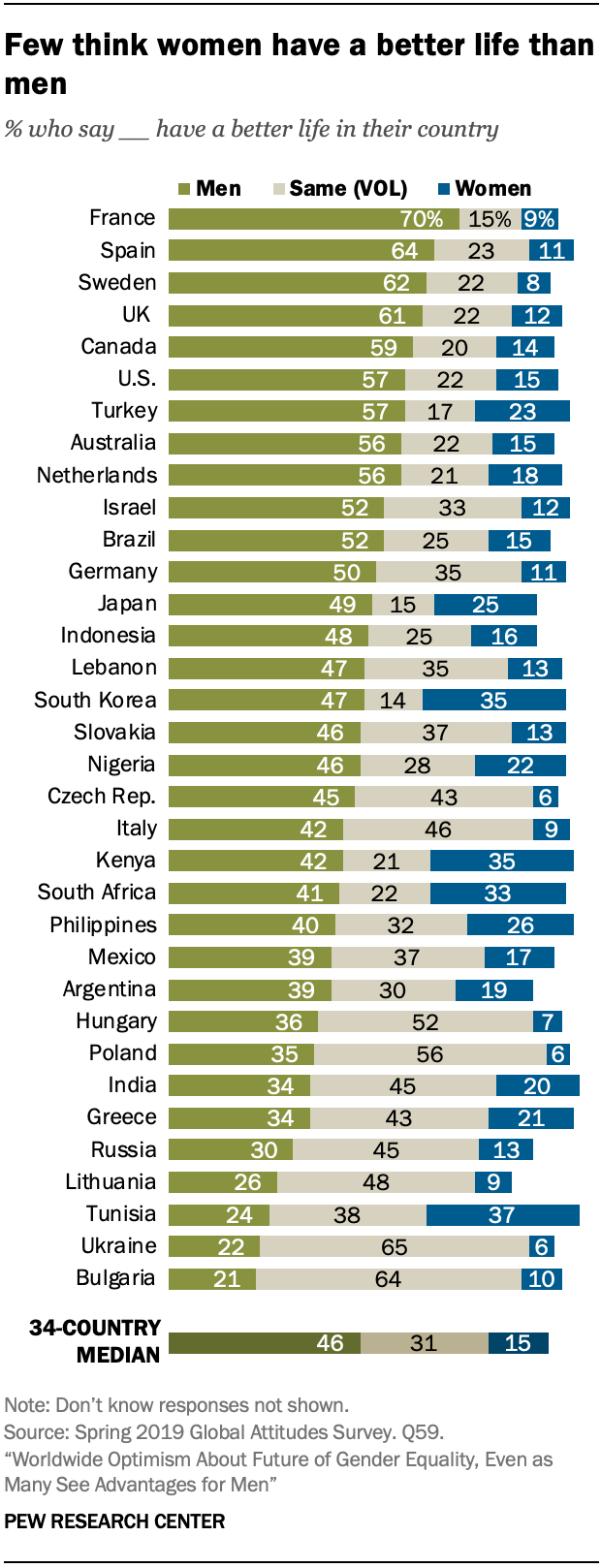
Though many people expect that their country will become more egalitarian in time, a median of 46% across the 34 countries surveyed say that, all things considered, men have a better life than women in their country.
Majorities in France, Spain, Sweden, the UK, Canada, the U.S., Turkey, Australia and the Netherlands say men have a better life than women in their country. Pluralities in many other countries express the same view.
The volunteered response that neither gender has a better life than the other is common in many countries, especially in Central and Eastern Europe. Roughly half or more provide this response in Ukraine, Bulgaria, Poland, Hungary and Lithuania.
A third or more in Tunisia, Kenya, South Korea and South Africa believe, all things considered, women have a better life than men. Tunisia is the only country surveyed where a larger share say women are better off (37%) than say men are (24%).
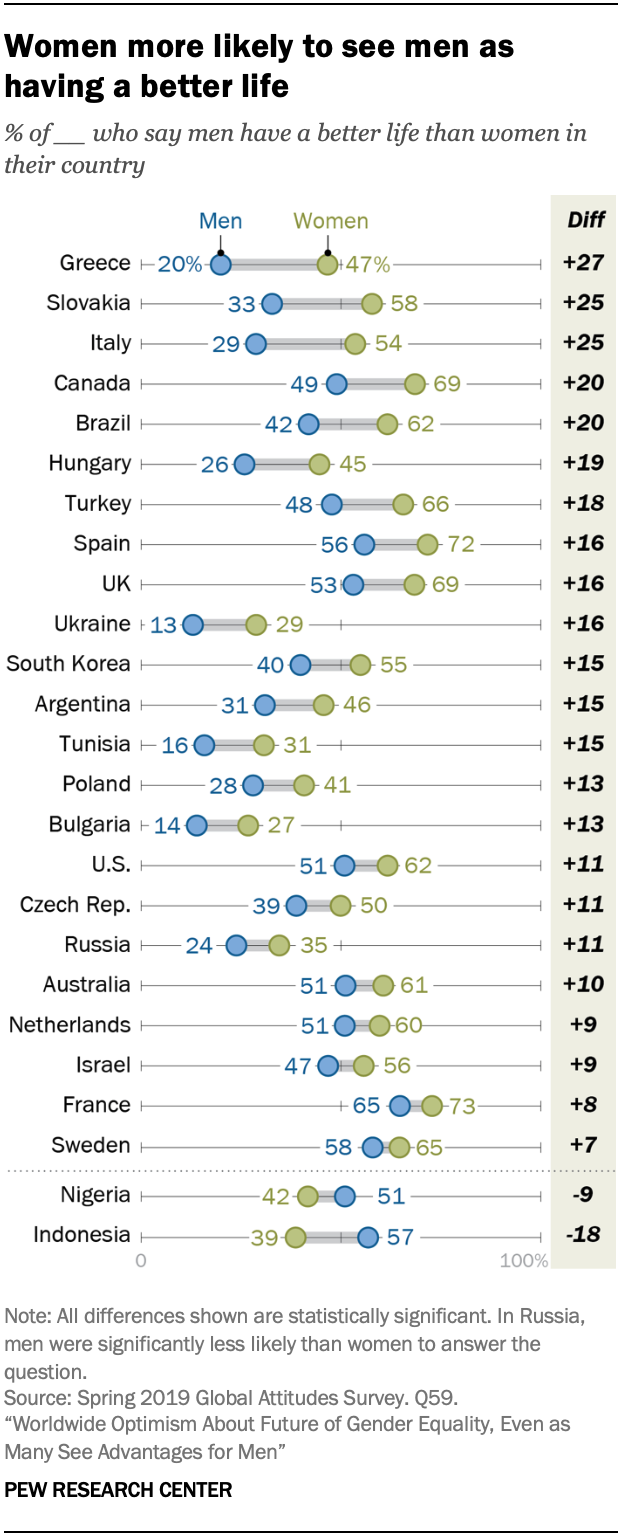
This question was last asked in a subset of countries in 2010. In many of these countries, the share who believe men have a better life than women has increased substantially. The largest change is in Turkey. Roughly one-third of people in Turkey said men had a better life than women in 2010, compared with 57% in 2019.
Increases of roughly 20 percentage points or more can also be seen in the UK, South Korea, Japan, Spain, Indonesia and the U.S. Smaller increases can be seen in Argentina, Mexico, Brazil and Kenya. Poland is the only country where this share has decreased since 2010, from 55% to 35% in 2019.
As with other questions related to gender equality, men and women tend to hold different views. In 23 of the 34 countries surveyed, women are more likely than men to believe that men have a better life in their country. In Greece, almost half of women hold this view, compared with only 20% of men. Differences of 20 percentage points or more can also be seen in Slovakia, Italy, Canada and Brazil.
Nigeria stands out again for showing the opposite pattern. Men (51%) are more likely than women (42%) to say that men are better off in their country. Indonesia shows a similar pattern.
Men generally seen as having more opportunities than women for high-paying jobs
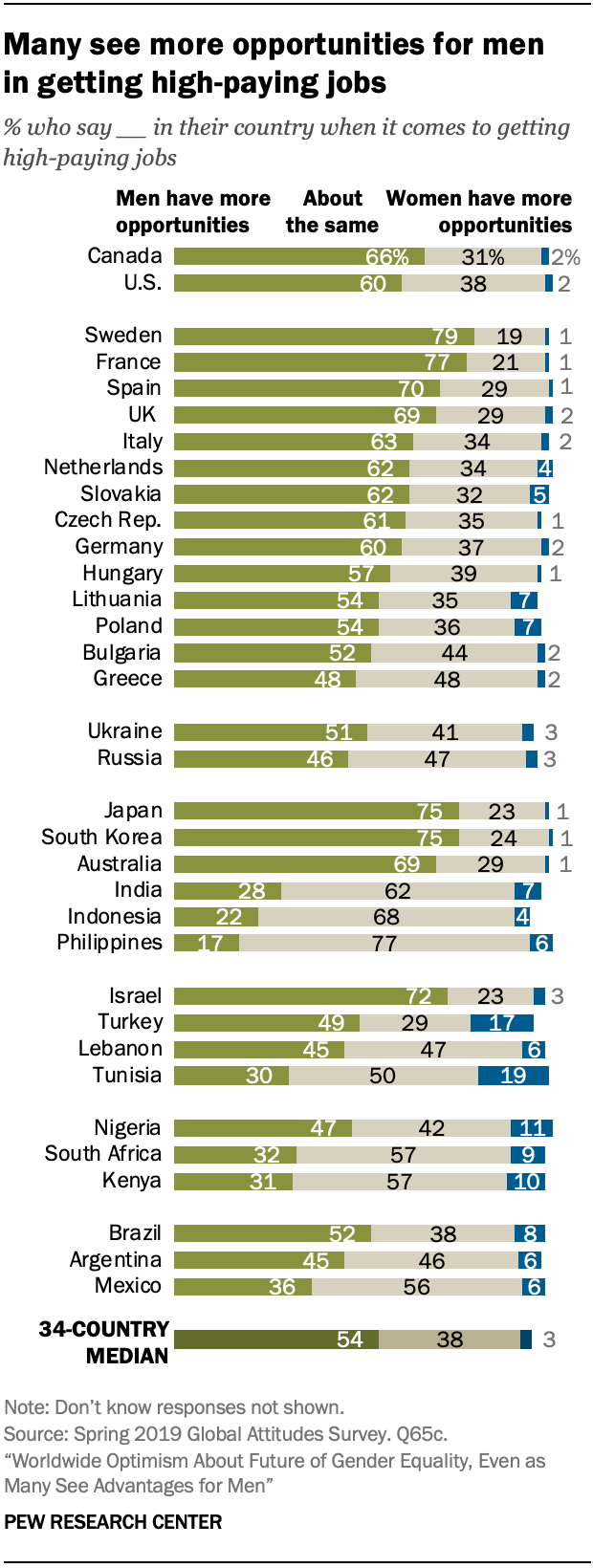
Majorities or pluralities in 22 of the 34 countries surveyed say men generally have more opportunities for high-paying jobs than women, including about two-thirds or more in Sweden, France, Japan, South Korea, Israel, Spain, the UK, Australia and Canada. More than four-in-ten in Greece, Nigeria, Russia, Lebanon and Argentina also think men in their country have more opportunities when it comes to getting high-paying jobs, but similar shares think opportunities are generally the same for men and women.
In the Philippines, Indonesia, India, South Africa, Kenya and Mexico, majorities say men and women have similar opportunities when it comes to getting high-paying jobs; half in Tunisia share this view.
Across most of the countries surveyed, women are significantly more likely than men to say men in their country have more opportunities when it comes to getting high-paying jobs. About two-thirds of women in the U.S. (66%) believe men in their country have more opportunities for high-paying jobs, compared with about half of men in the U.S. (53%). And while majorities of men and women in Canada say men have more opportunities in this area, women are far more likely to say this is the case (77% vs. 55%, respectively). This pattern is evident in nearly every European country surveyed (Greece and Lithuania are the exception), as well as in Australia, Ukraine, Brazil, South Korea, Russia, Argentina and Japan.
Many say men have more opportunities than women to be leaders in their community
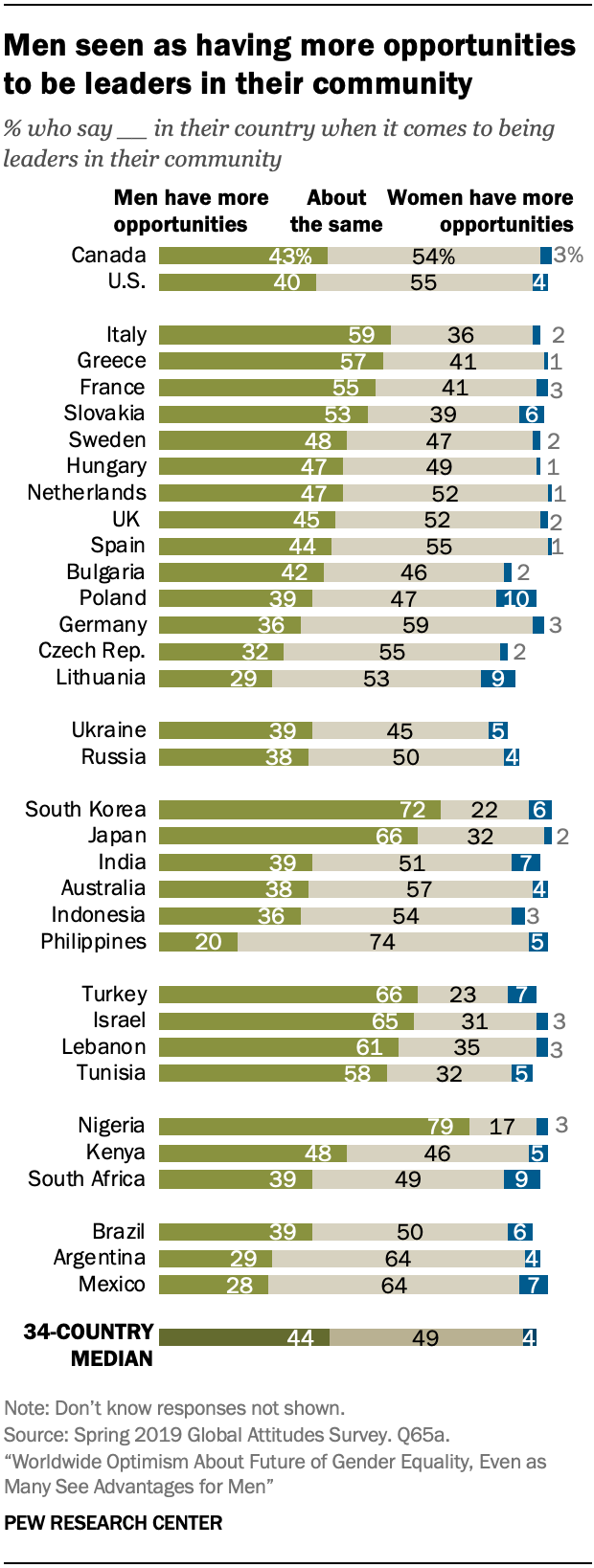
When it comes to opportunities to be leaders in their community, majorities in Nigeria, South Korea, Japan, Turkey, Israel, Lebanon, Italy, Tunisia, Greece and France say men in their country have more opportunities than women; about half in Slovakia say the same.
Even in many countries where majorities or pluralities believe men and women in their country generally have the same opportunities to be leaders in their community, sizable shares say men have more opportunities than women. For example, about four-in-ten or more in Spain, Canada, the U.S., Brazil, South Africa, India, Russia and Australia say this is the case in their country.
For the most part, men and women offer similar views on this. But to the extent that there is a difference, women tend to be more likely than men to see an advantage for men in getting opportunities to be leaders in their community. The exception is Kenya, where men (53%) are more likely than women (43%) to say men have more opportunities to be leaders in their community.
Publics see more gender parity when it comes to people’s opportunities to express their political views and to get a good education
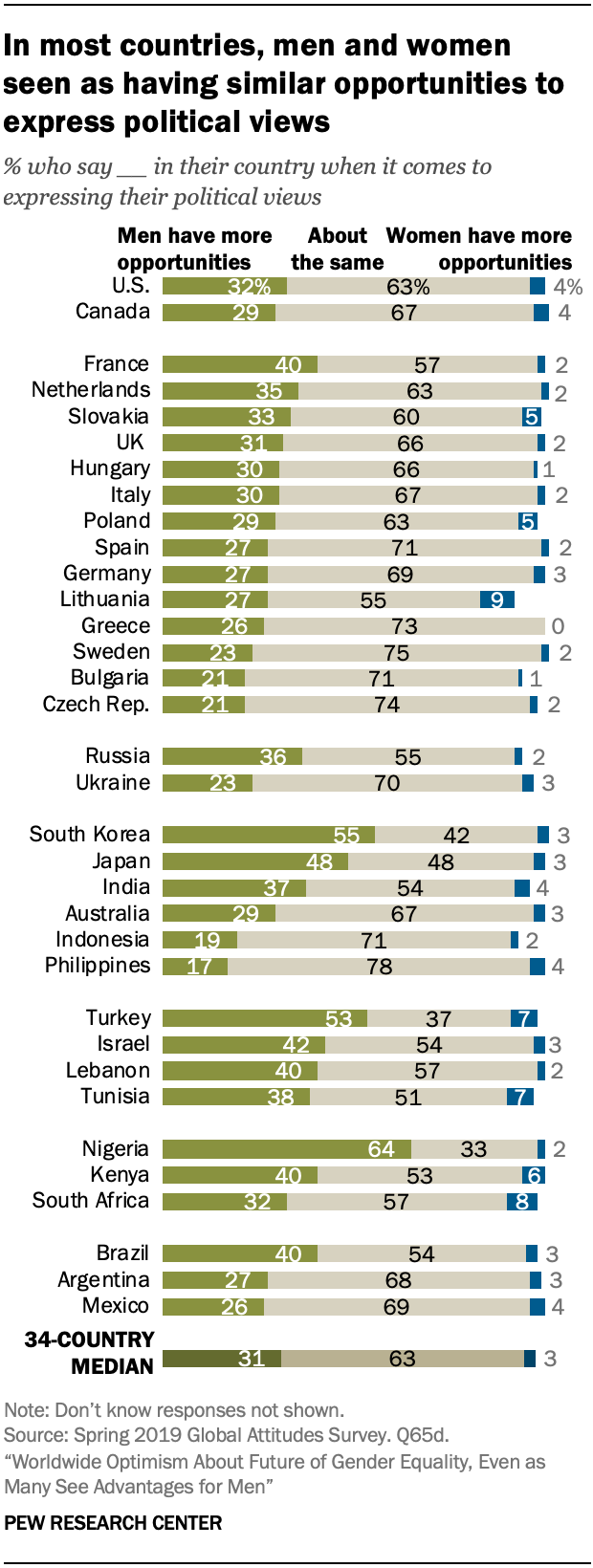
In 30 of the 34 countries surveyed, majorities or pluralities think men and women in their country have about the same opportunities when it comes to expressing their political views. About half in Japan also believe this, but an identical share says men have more opportunities than women.
More than six-in-ten Nigerians (64%) say men in their country have more opportunities than women when it comes to expressing their political views, as do 55% in South Korea and 53% in Turkey. Even in countries where majorities or pluralities believe men and women have about the same opportunities in this area, the shares saying men have more opportunities than women exceed the shares saying women have more opportunities by at least 10 percentage points.
Opinions on this generally do not vary significantly by gender, but in nine countries, women are far more likely than men to say men in their country have more opportunities to express their political views. For example, in South Korea, a majority of women (60%) think men in their country have more opportunities to express their political views, compared with 49% of South Korean men.
Gender gaps are also evident in the Netherlands (41% of women vs. 28% of men say men have more opportunities), Australia (36% vs. 23%), Spain (34% vs. 21%), Canada (34% vs. 23%), France (45% vs. 35%), the UK (36% vs. 27%), the U.S. (36% vs. 28%) and the Czech Republic (24% vs. 17%).
Kenya is the only country surveyed where men are more likely than women to say men in their country have more opportunities to express their political views. More than four-in-ten Kenyan men (45%) say this, compared with 35% of Kenyan women.
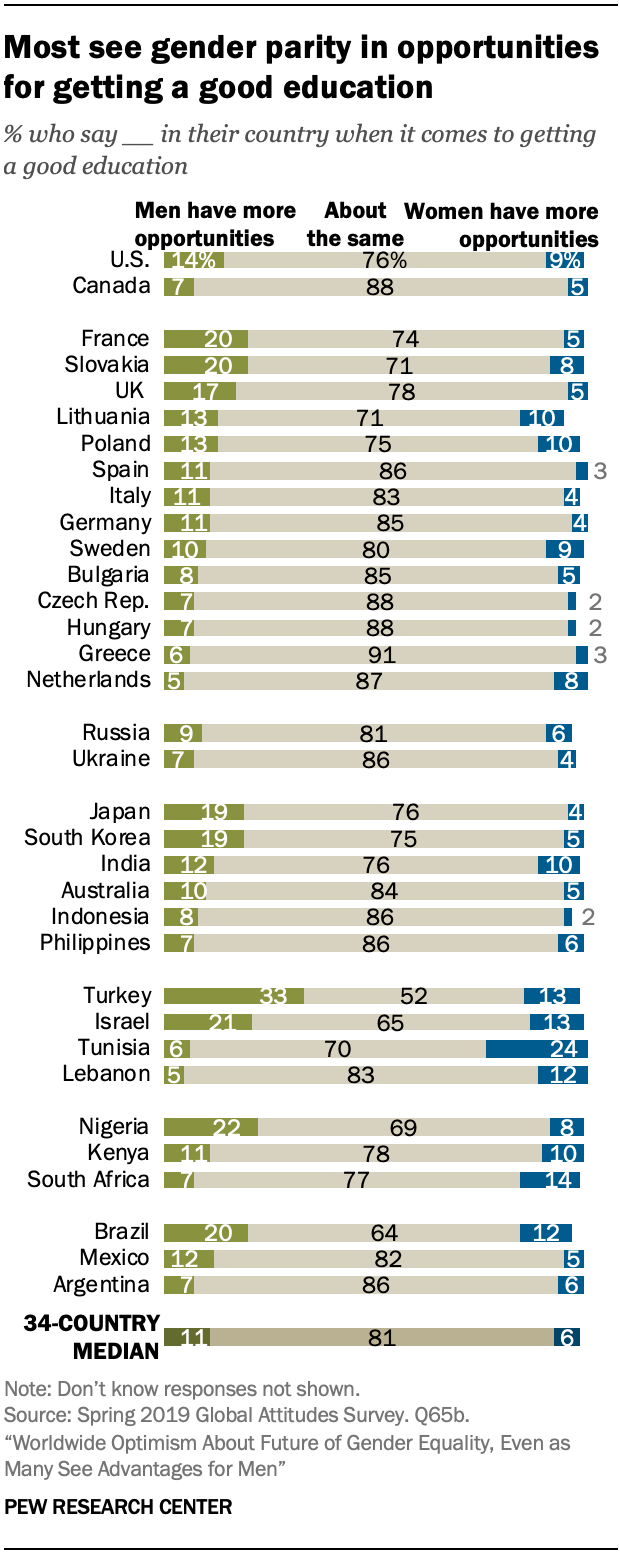
When it comes to getting a good education, majorities in all but one country surveyed – ranging from 64% in Brazil to 91% in Greece – say men and women in their country have about the same opportunities. About half say the same in Turkey.
One-third of the public in Turkey and about one-in-five in Nigeria, Israel, France, Slovakia, Brazil, Japan and South Korea think men in their country have more opportunities than women when it comes to getting a good education; smaller shares in these countries think women have more opportunities than men.
Tunisia is the only country surveyed where a significantly larger share says women have more opportunities than men to get a good education than say men have more opportunities than women. About a quarter of Tunisians (24%) see women as having more opportunities in this area, compared with 6% who say men do; 70% believe men and women have about the same opportunities to get a good education.
With the exception of Turkey, majorities of men and women across the countries surveyed believe both genders have about the same opportunities when it comes to getting a good education. And for the most part, differences in how men and women see this are modest at best.
Many say men have more influence than women when it comes to making important decisions about household finances
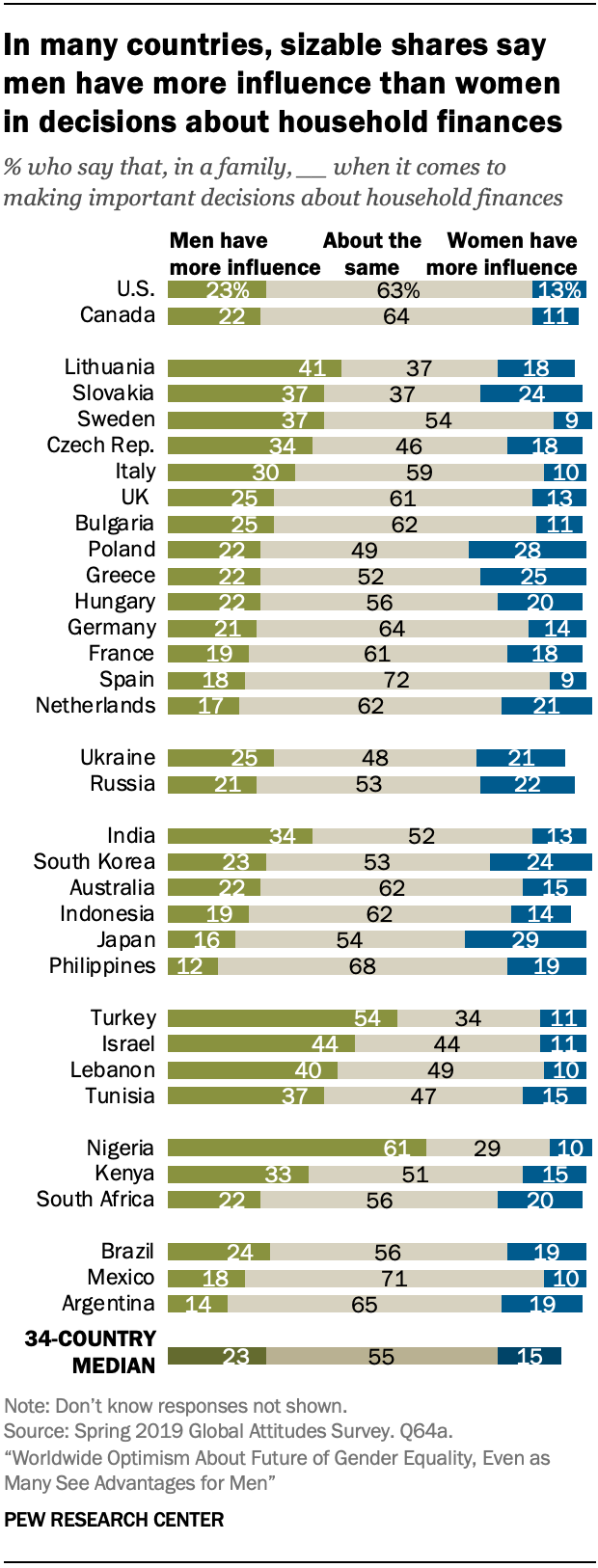
Across the 34 countries surveyed, a median of 55% say that, in a family, men and women have about the same influence when it comes to making important decisions about household finances; 23% say men generally have more influence and 15% say women do.
To the extent that people see one gender having more influence when it comes to making important decisions about household finances, men are generally seen as having more influence than women. In 16 of the 34 countries surveyed, more say men have more influence than say women do by a margin of at least 10 percentage points. The gap is particularly wide in Nigeria, where 61% say men generally have more influence in this area (compared with 10% who say women do), Turkey (54% vs. 11%), Israel (44% vs. 11%), Lebanon (40% vs. 10%) and Sweden (37% vs. 9%). In each of these countries, people are at least four times as likely to say men have more influence as they are to say women do.
Among European publics, majorities or pluralities in 12 of 14 countries surveyed say men and women generally have about the same influence in making important decisions about household finances. The only two European countries surveyed where this is not the case are Lithuania and Slovakia, where similar or equal shares say both genders have about the same influence as say men have more influence in this area.
Majorities in the three Latin American countries surveyed – Mexico, Argentina and Brazil – say men and women have about the same influence in making important decisions about household finances. This is also the case in the Philippines, Canada, the U.S., Australia, Indonesia and South Africa.
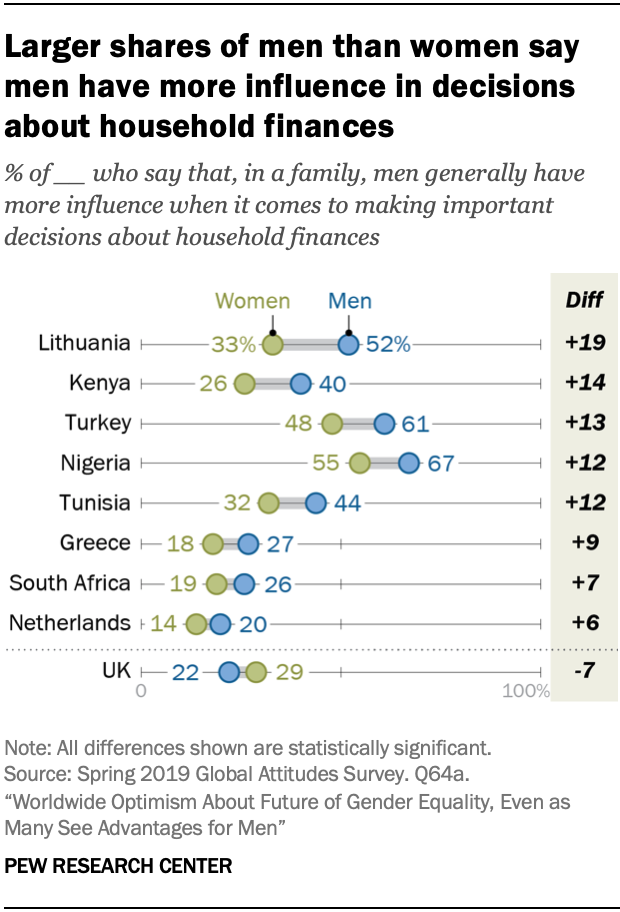
Japan is the only country where the share saying women have more influence when it comes to making important decisions about household finances is significantly larger than the share saying men do (29% vs. 16%). Still, 54% in Japan say men and women generally have about the same influence.
In most of the countries surveyed, men and women have similar views on this question, but where differences emerge, men are typically more likely than women to say men in their country have more influence when it comes to important decisions about household finances, while women are more likely to say either women do or that both are about equal. For example, 61% of men in Turkey (vs. 48% of women) say men in their country have more influence than women. The UK is the only country surveyed where women are more likely than men to say men have more influence when it comes to making important decisions about household finances.
Larger shares say women have more influence when it comes to how to raise children than say men do
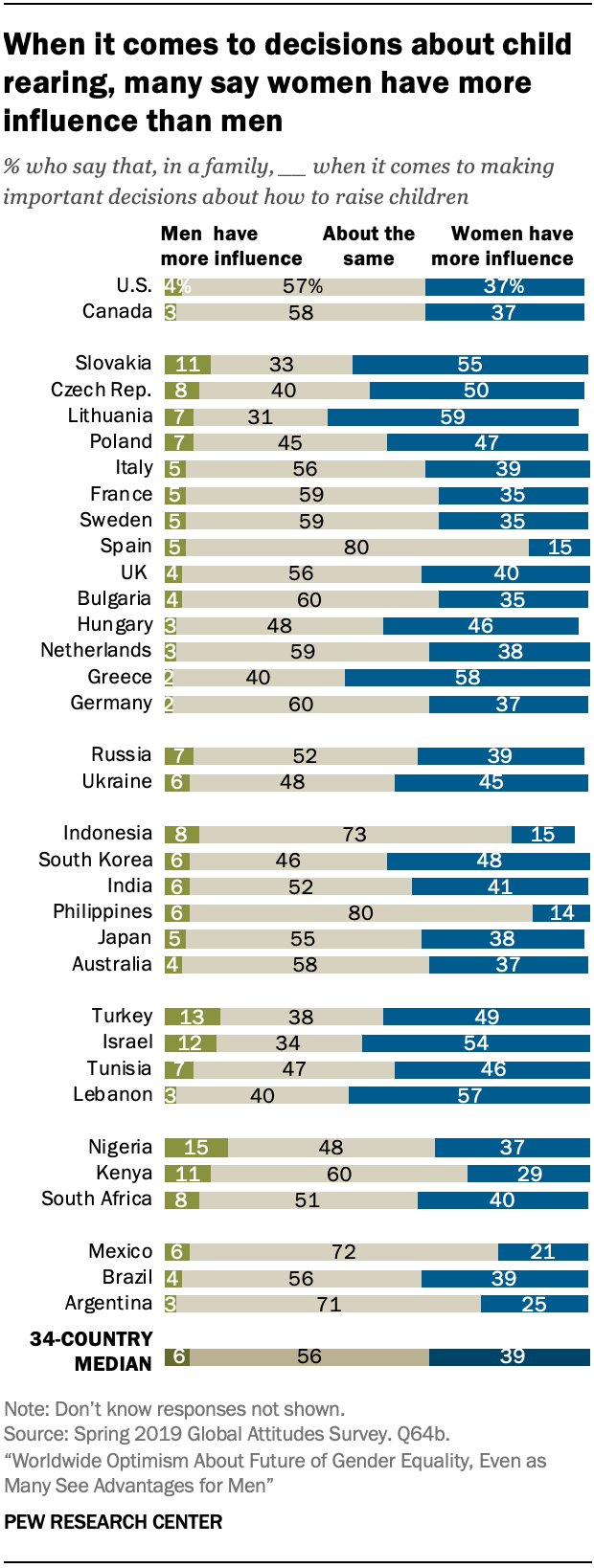
When it comes to who in a family has more influence when it comes to making important decisions about how to raise children, a median of 56% across the 34 countries surveyed say men and women have about the same influence; 39% say women have more influence and just 6% say men do.
Majorities in 18 of the 34 countries surveyed say that, in a family, men and women have about the same influence when it comes to making important decisions about how to raise children. Still, in nearly every country, far larger shares say women have more influence in this area than say men do. And in seven of the 34 countries – Lithuania, Greece, Lebanon, Slovakia, Israel, the Czech Republic and Turkey – majorities or pluralities say women in their country have more influence than men in making important decisions about raising children.
Men and women generally agree in their assessments of who has more influence when it comes to decisions about how to raise children, but there are exceptions. For example, in Brazil, women (43%) are more likely than men (34%) to say women in their country have more influence in making important decisions in this area; in turn, Brazilian men (61%) are more likely then Brazilian women (52%) to say both have about the same influence.
People generally think men and women have about the same influence when it comes to decisions about their family’s religious practices
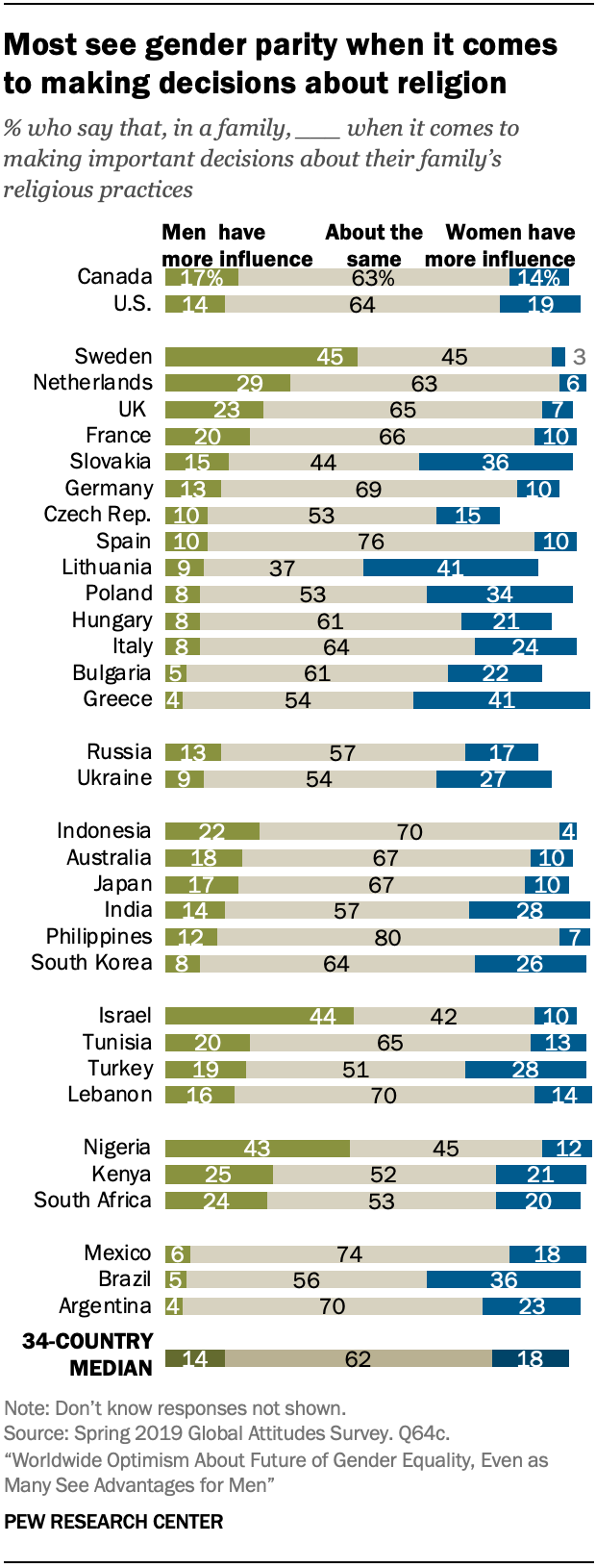
Across the 34 countries surveyed, a median of 62% say that, in a family, men and women generally have about the same influence when it comes to making important decisions about their family’s religious practices; 18% say women have more influence, while 14% say men do.
Across most of the countries surveyed, majorities or pluralities say men and women have about the same influence when it comes to making important decisions about their family’s religious practices. There are a few exceptions to this pattern. In Sweden, Israel and Nigeria, similar shares say men and women have about the same influence as say men have more influence than women in this area. And in Lithuania, 37% say men and women have the same influence and 41% say women have more influence.
In Israel, Kenya, Nigeria and South Africa, men are more likely than women to say that men in their country have more influence when it comes to making important decisions about their family’s religious practices. About half of men in Israel (51%) and Nigeria (49%) say this, compared with 38% of Israeli women and 36% of Nigerian women. And while about three-in-ten South African (28%) and Kenyan (31%) men say men in their country have more influence over important decisions about their family’s religious practices, two-in-ten women in each of those countries say the same.
In turn, women in Brazil, South Korea, Nigeria, Russia, France and Lebanon are more likely than their male counterparts to say women have more influence in making important decisions about their family’s religious practices. The gender difference is largest in Brazil, where 42% of women – vs. 29% of men – hold this view.
In nearly all countries surveyed, majorities prefer an egalitarian marriage
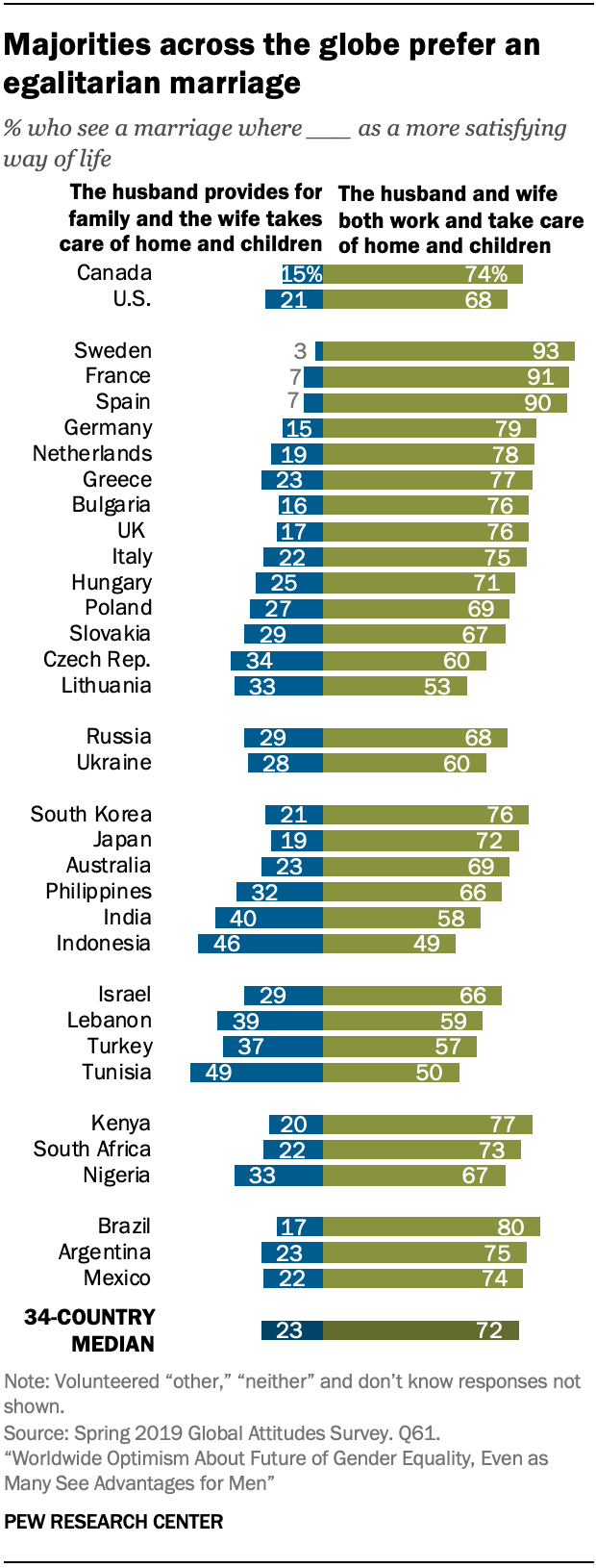
A median of 72% across the 34 countries surveyed say a marriage where both the husband and wife have jobs and take care of the house and children is a more satisfying way of life than one where the husband provides for the family and the wife takes care of the house and children. The shares saying that a more egalitarian marriage is better are lowest in Lithuania, Tunisia and Indonesia.
Publics in Sweden, France and Spain are the most likely to say an egalitarian marriage is preferable to one where the husband provides for the family and the wife takes care of the house and children. This view is also widespread in Brazil, Germany, the Netherlands, Greece, Kenya, Bulgaria, the UK, South Korea, Italy and Argentina, where at least three-quarters say the same.
In Tunisia and Indonesia, views on the more satisfying type of marriage are split. About half in each country prefer a marriage where the husband and wife both have jobs and take care of the house, while similar shares prefer a marriage with more traditional gender roles.
Even in some countries where majorities or pluralities prefer an egalitarian marriage, substantial shares say a marriage where the husband provides for the family and the wife takes care of the house and family would be more satisfying. For example, a third or more in India, Lebanon, Turkey, the Czech Republic, Nigeria and Lithuania say a more traditional marriage would be preferable.
Views on this vary somewhat by gender, but the differences tend to be relatively small, even in some countries where they are statistically different. In Poland, Turkey and Argentina, women are more likely than men to prefer an egalitarian marriage by a double-digit margin (10 percentage points in Poland, 11 points in Turkey and 12 points in Argentina).
Opinions vary more widely across educational attainment. Those with more education more likely to prefer a marriage where both the husband and wife have jobs and take care of the house and children in most of the countries surveyed. In fact, in 17 countries, those with more education are more likely to say this by 10 or more points, including difference of at least 20 points in Turkey (25 points more likely), Lebanon (21 points) and Brazil (20 points).
Age is also linked to views on what type of marriage is preferable in about half of the countries surveyed, with people younger than 30 more likely than those ages 50 and older to say a marriage where both the husband and wife have jobs and take care of the house and children is the more satisfying way of life. The difference is particularly pronounced in Lithuania, where 71% of those younger than 30 prefer an egalitarian marriage, compared with 43% of those ages 50 and older. There are also double-digit age differences in the U.S., Canada, Italy, the UK, the Czech Republic, Poland, Slovakia, Australia, South Korea, Lebanon, Tunisia, Argentina, Brazil and Mexico.
Preference for an egalitarian marriage has increased in three of the 16 countries where this question was also asked in 2010 (by 11 percentage points in South Korea, 8 points in Argentina and 6 points in Nigeria). In contrast, smaller shares now see an egalitarian marriage as preferable in Turkey, Indonesia, Russia and Germany. The steepest decline is in Turkey. About six-in-ten (57%) now say a marriage where both the husband and wife have jobs and take care of the house and children is the more satisfying way of life, compared with 72% a decade ago.




